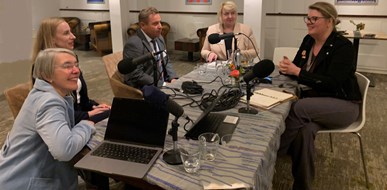[Podcast]: ‘Ukrainian war crimes trials with Ukrainian judges’
Published 5 December 2022
New Asymmetrical Haircuts podcast episode on the current pressures faced by Ukrainian judges.
Leaving the court every time the alarm goes off and working around power cuts that have halved working days to four hours. These are some of the working conditions of judges in Ukraine. The potential war crimes cases being investigated now amount to 36.000. How are Ukrainian judges managing these pressures?
During the recent MATRA- Ukraine Conference organised by the T.M.C. Asser Instituut with Global Rights Compliance, international justice podcast makers Asymmetrical Haircuts talked to Ukrainian judges Hanna Maina and Svitlana Yakovleva about their realities and how the Ukrainian judiciary is adapting.
Organisational solutions
Svitlana Yakovleva is a judge at the Supreme Court of Ukraine and she explains which organisational solutions have been found to tackle war crimes in a law system that did not have to deal with them before. Hanna Maina is a judge at the Novomoskovskyi Court of Dnipropetrovsk region so she has the on-the-ground experience of a first-instance court. Together with Hanna and Svitlana, the podcast also addresses some of the current debates: can Ukrainian defence judges be fair? And how can the international system support Ukraine’s national courts?
For a broader perspective on these national trials, Asymmetrical Haircuts caught up with Gaiane Nuridzhanian from the National University of Kyiv-Mohyla Academy in Ukraine and the UiT-Arctic University of Norway. She gives her view on war crime cases; on whether these rather quick trials can also be fair, and on what holistic justice like reparations may mean for Ukrainians.
Listen to the full podcast by Assymetrical Haircuts podcast makers Janet Anderson and Stephanie van den Berg.
About the Matra Ukraine project
The MATRA project 'Strengthening Ukraine’s Capacity to Investigate and Prosecute International Crimes’ is a joint initiative of the T.M.C. Asser Instituut and Global Rights Compliance. The project is designed to assist the newly created War Crimes Unit in Ukraine to investigate, prosecute and seek remedies for international crimes. Alongside supporting the Office of the Prosecutor General, it will deliver vital technical and strategic expertise to other criminal justice entities, such as judges and lawyers, civil society organisations and journalists.
The project is funded by the Netherlands Ministry of Foreign Affairs under the MATRA (MAatschappelijke TRAnsformatie: social transformation) Programme and supported by the Netherlands Ministry of Justice and Security.
